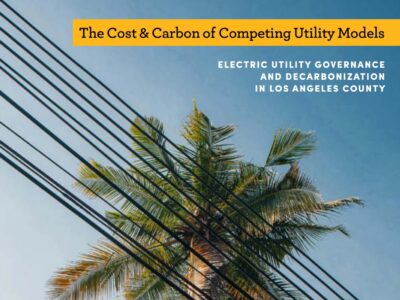Georgia: A Peach of an Energy Policy
Georgia’s energy policy is much better than you’d expect from its Southern location and politics.
Georgia is a bit of a surprise. It is a leader in solar energy in a region that generally has not been very friendly to renewables. It currently ranks 9th nationally in total solar installations (and even more surprisingly, ranked 3rd in 2016 in newly added solar). What’s also surprising is that Georgia has done this with only a voluntary Renewable Portfolio Standard. Both houses of the state legislature have roughly 2-to-1 GOP margins. But despite the lack of a legislative mandate, the integrated resource plan with the state public utility commission commits Georgia Power to developing or acquiring 1600 MW of renewable energy, mostly through a competitive bid process. The company claims to have the biggest voluntary renewable portfolio in the country.
How did this come about? The military may have played a role in Georgia’s recent foray into solar energy. Georgia Power signed an agreement with the Pentagon to supply 30 MW to each of five military bases, a $400 million project in total.
Still, the overall energy mix isn’t that great, at least not yet. According to the Energy Information Agency, “Georgia’s four existing nuclear reactor units accounted for 26% of the state’s net electricity generation in 2016, coal accounted for 28%, natural gas accounted for 40%, and renewable energy, including hydroelectric power, contributed more than 6%.” The 28% share of coal could go down even more, if Georgia completes the two new nuclear reactors under construction. But it’s unclear whether that willl happen given that the reactors have already had massive cost overruns.
According to the pre-Trump EPA, Georgia will begin to feel the effects of climate change in upcoming years:
“Like other southeastern states, Georgia has warmed less than most of the nation during the last century. But during the next few decades, the changing climate is likely to harm livestock, increase the number of unpleasantly hot days, and increase the risk of heat stroke and other heat-related illnesses.”
In addition,
“Whether or not storms become more intense, coastal homes and infrastructure will flood more often as sea level rises, because storm surges will become higher as well. Rising sea level is likely to increase flood insurance rates, while more frequent storms could increase the deductible for wind damage in homeowner insurance policies. Parts of Savannah and Brunswick are vulnerable to coastal flooding, which is likely to become more severe as sea level rises.”
Of course, it would be unthinkable for this highly conservative state government to make any actual plans to deal with these issues.
As in many states, city government is ahead of the state as a whole on energy issues. Atlanta’s city council adopted a resolution in May 2017 giving the city’s Office of Sustainability until the end of the year to “develop a plan for City of Atlanta operations to achieve 100% clean energy by 2025 and community-wide 100% clean energy by 2035.” The plan must include “interim milestones, budget estimates, equity metrics, estimated financial impacts, financing mechanisms, and the percentage of clean energy that shall be locally and distributively generated.” The city also has a plan to create a modern streetcar system.
Atlanta’s mayor denounced Trump’s decision to withdraw from the Paris Agreement:
“The President has made a disappointing decision today to withdraw the United States from the Paris climate agreement, and by extension, global leadership. This decision isolates our country from international partners in shared, global efforts to curb climate change, and at its core is an assault on our future stability and prosperity.”
The mayor promised that the city would “intensify our efforts to reduce CO2 emissions, work to cool the planet by two degrees, ramp up clean energy solutions, and seek every opportunity to assert our leadership on this urgent issue.” Hopefully, the state as a whole will move further in that direction.







Reader Comments